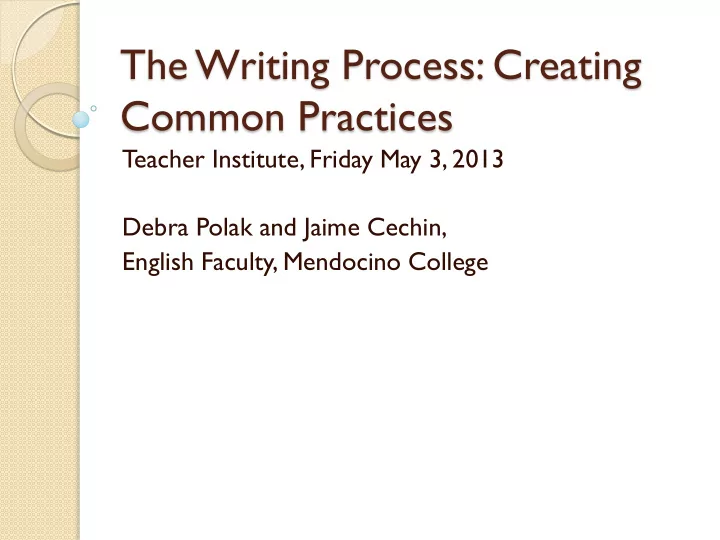

The Writing Process: Creating Common Practices Teacher Institute, Friday May 3, 2013 Debra Polak and Jaime Cechin, English Faculty, Mendocino College
Opener In pairs, discuss: If you are an English teacher, what do you hear about student writers outside your discipline. If you are not an English teacher, what is your general assessment of the student writing you see.
Writing Skills and Issues What are the big issues around student writing? What, specifically, do you wish they did better? What writing skills are well developed in our students? Which skills/issues are best addressed in an English class? Which skills/issues can be addressed in other courses or learning environments? Where? How?
ISLO Assessment Results – an Inspiration ISLO #2 – Express ideas with clarity, logic, and originality in both spoken and written English. Assessment Team Recommendations for ISLO #2: Increased instructional focus, including professional development, on essay structure/organization. While “Clarity” scores are consistently higher, the low scores regarding “Logic” are a concern. We feel that students would benefit greatly from increased organizational instruction. With this in mind, we recommend additional professional development opportunites for all faculty to help our students achieve this ISLO.
ISLO Inspiration continued ISLO #6 – Access, interpret, evaluate, and synthesize information using multiple resources, including current information technology. Assessment Team Recommendations for ISLO #6: Encourage campus-wide discussion regarding research papers and expectations. Artifacts indicate inconsistency in assignment expectations across disciplines, particularly concerning incorporating source material in student writing. We recommend a “ norming ” activity and communication among disciplines to work toward common research expectations. Provide professional development focusing on the Library. With the new Library soon to be completed, we recommend Mendocino College takes the opportunity to further educate faculty on the scope of resources available to our students. Scores indicate that students are very capable of using the Library to find information, but their ability to incorporate such information into an assignment is lacking. The resources available through the Library can help them to better synthesize sourced information, so the College must work to keep the student population informed of said resources.
Writing Assignments In Pairs: Brainstorm a list of types of writing assignments in your classes. Share any materials you brought. Talk to each other about the process you and your students follow to complete the assignment ◦ What elements are worked on in class? How much instructional time is spent on the assignment? ◦ What parts are students expected to do on their own?
The Writing Process – some examples Expository Reading and Writing Course T emplate Debra and Jaime’s Research Paper
The Writing Process — how to import/export What elements of the Writing Process can we embrace across disciplines and other learning environments? How can we do it?
Current campus writing support Reading and Writing Lab (English 60/160/560) — Mon through Thursday 10:30 – 1:30 Writing Workshops Tutors The Learning Center is the hub for all of this. T ell your students to go to the Learning Center. Maybe have them meet you there?
Ideas for further support?
General Principles Be explicit about expectations and grade accordingly Provide models of good writing Regard students as apprentices of our disciplines Listen and share across the disciplines Reinforce each other’s good work
More Principles
Recommend
More recommend